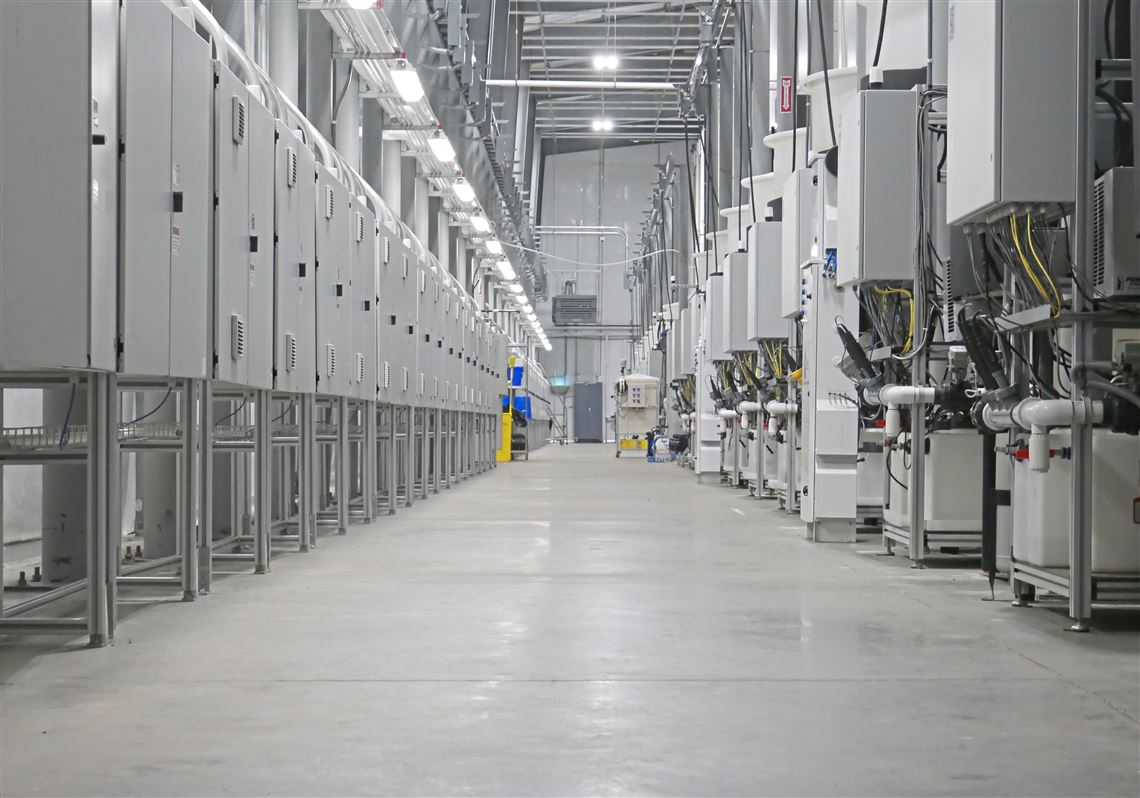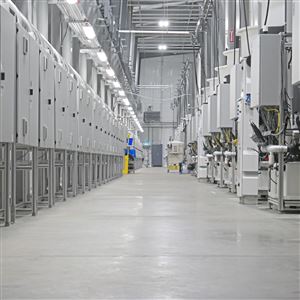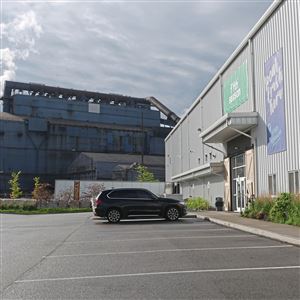A year after it shuttered operations at its 60,000-square-foot farming facility in Braddock, the vertical farming startup Fifth Season has filed for bankruptcy.
Michael Von Lehman, president of Meridian Management Partners, had been trying to find a new buyer for the plant after he was brought on as chief restructuring officer in December. But the vertical farming industry is too fragile for any company to take on such a significant acquisition right now, he said.
"The filing of the chapter seven bankruptcy, I believe, is the end," Mr. Von Lehman said in an interview with the Post-Gazette.
RDC, the owner and developer that poured $30 million into the autonomous farming facility, had planned to convert the space to food manufacturing in early July if a new operator wasn't found. The building was listed for sale for $12 million in June by the commercial real estate firm CBRE Inc.
"I don't believe it was inevitable," Mr. Von Lehman said of the Oct. 23 bankruptcy filing. "We did have vertical farms interested."
But at the same time, those companies were navigating their own financial distress, which made an investment unfeasible, he said.
A ‘very sophisticated’ — and costly — method
Fifth Season did not own most of the assets it operated, Mr. Von Lehman said. It leased the Braddock building and most of its equipment.
"There isn't a lot of intellectual property left."
Fifth Season is listed as the debtor under the name Robotany LTD, represented by Brian Thompson of Thompson Law Group. He did not respond to requests for comment. The startup's co-founders, brothers Austin Webb and Brac Webb, started a new venture, Nudais, in April. Neither could be reached for comment. Their third co-founder Austin Lawrence said he is employed full time in a new robotics industry and keeping specifics of his work private for the time being.
According to a filing with the United States Bankruptcy Court for the Western District of Pennsylvania, the company estimated its asset value ranges between $50,001 and $100,000. Its liabilities are estimated to be between $10,000,001 and $50 million.
At its peak, Fifth Season put out 500,000 pounds of leafy greens a year to regional grocers like Giant Eagle, Kroger, and Whole Foods. It raised $75 million in outside investments and planned to open a second farming facility in Columbus, Ohio.
As for the future of vertical farming, Mr. Von Lehman said the industry is currently too niche, limited to microgreens, herbs and "things of that nature where you're obviously not going to feed a country."
And even to get to that point, a company has to invest significant capital.
"Fifth Season was very technologically advanced and had a very sophisticated method,” Mr. Von Lehman said. “But with discovering that method comes a lot of expense. And at some point, the rubber hits the road.
"That's not to say they were unsuccessful in their endeavor."
‘Always in a cash-burn position’
New technology is hard, he noted.
Even Warren Buffett doesn't like investing in new tech, he said, “because it's hard to pick the winners and losers.” In September, two indoor farming companies with strong startup money — New Jersey’s AeroFarms and Kentucky’s AppHarvest — filed for bankruptcy, the Associated Press reported.
Coincidentally, Fifth Season's bankruptcy filing came the same day Pittsburgh was snubbed when it was not given a national "tech hub" designation by the U.S. Economic Development Administration. When the startup first closed in October, 2022, Pittsburgh's tech community was still reeling from the closure of the driverless car startup Argo.ai, which came just days prior.
Mr. Von Lehman doesn't believe Fifth Season's failure is a reflection on the Pittsburgh region.
"To me, it's just part of the process," he said. "When you're dealing with young, maturing companies, they're always in a cash-burn position."
More tech companies fail in Silicon Valley, he said, because more are trying their hand there.
Some were quick to defend Pittsburgh's tech sector when Fifth Season and Argo.ai flopped. County executive Rich Fitzgerald said he was still "very optimistic about where Pittsburgh is going."
Still, some worried the failures would start a broader exodus, potentially led by Aurora, the driverless trucking company that had been considering a sale to Apple.
Instead, that startup has flourished, while its competitor — Locomation — became the next apple to fall.
Searching for answers
Startups shutter for a variety of reasons: lack of capital, an opaque path to profitability, over-commitment.
Chris Cerveny, a former vice president at Fifth Season, chalked up the farm's shuttering to high expectations and reticent funding from Silicon Valley backers. But he also acknowledged over-investing in automation.
"We probably spent too much on bots that we didn’t need," he said at an Ag-Con panel on ‘failure’ earlier this year.
Fifth Season backers Foothill Ventures, Drive Capital and 99 Tartans could not be reached for comment.
In an interview with the Post-Gazette, Mr. Cerveny said his startup’s hasty closure sent the wrong message.
"It's incredibly sad," he said. "We were all motivated by the idea that we were going to bring fresh food and jobs to a community like Braddock. It's sad to be part of the problem in Braddock of another company leaving town."
The decline came as a surprise.
"We were all talking about how we were on our path to profitability and how we were almost there," Mr. Cerveny said. "Then all of a sudden, it was like, overnight, we were closed."
Mr. Cerveny was also surprised that the robust business he felt they had grown only amassed $100,000 in assets. Even if some of the equipment was rented, the system that helped all the elements work together had to be worth something, he said.
"I can't believe it," he said. "What happened?"
Many of Fifth Season's manager-level staff pivoted to other farms across the country and internationally, Mr. Cerveny said. Those with general skills like marketing were able to stay in Pittsburgh. He's less certain about the general laborers.
Partially because of his new role as a self-employed consultant, Mr. Cerveny remains optimistic for future vertical farming efforts in Pittsburgh. "The fact that this closed creates an opportunity for someone else to do it better," he said.
Dave Mawhinney shares that hope.
He worked closely with Fifth Season as a personal investor and advisor. He also has insights into Pittsburgh’s venture capital scene as director of the Swartz Center for Entrepreneurship at Carnegie Mellon University.
“The reality is, it wasn’t just one thing, it was many environmental factors,” Mr. Mawhinney said of Fifth Season’s closure.
‘A great vote of confidence’
There was a pivotal moment in early 2022, Mr. Mawhinney said.
A lead investor dropped out ahead of a May funding round, and company insiders responded by completely overhauling the board. The new leadership had two options, Mr. Mawhinney said: raise enough money to get through the end of the year, or pursue strategic alternatives. By the end of October, they had run out of money.
Their struggle wasn’t entirely unique.
“Locomation ran into similar problems,” Mr. Mawhinney said. “Argo.ai ran into similar problems. It doesn’t mean that those companies weren’t doing good things and making progress. They ran into very difficult economic circumstances.”
Mr. Mawhinney said the sudden shuttering still came as a “shock.” But because he wasn’t in the boardroom, he isn’t sure if they could’ve done anything differently.
“I think vertical farming is going to be a huge part of our future,” he said, grateful for a “first wave of valiant companies” that set the groundwork for a profitable industry. “We iterate and we learn.”
As for Nudais, the Webb brothers’ new venture, Mr. Mawhinney said: “They have received support from their previous investors to help them along this path. I think that’s a great vote of confidence for them.”
Evan Robinson-Johnson: ejohnson@post-gazette.com or @sightsonwheels
First Published: November 12, 2023, 10:30 a.m.
Updated: November 14, 2023, 4:14 a.m.



















